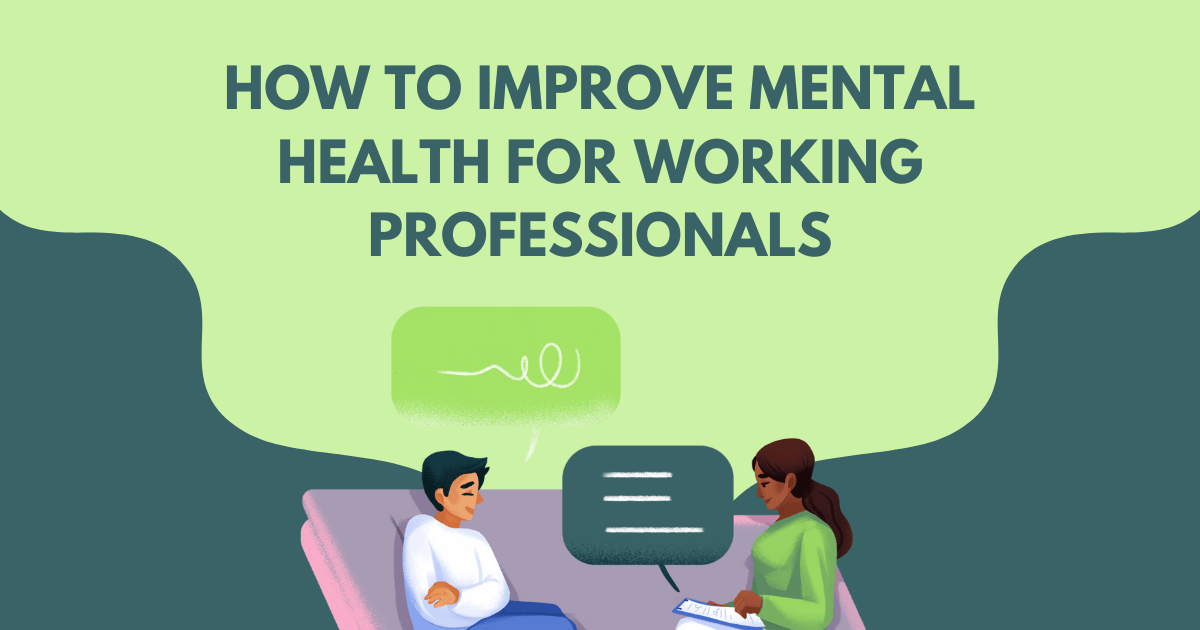Struggling to stay focused and happy at work? In this article we explore How To Improve Mental Health For Working Professionals. The pressure of deadlines, maintaining a work-life balance and office politics, can really take a pressure on your mental health. But fear not! Here are 13 effective strategies to improve your mental well-being and enjoy your job more, helping you thrive in your career:
Prioritize Self-Care:
- Treat yourself! Do things you love, like reading a captivating book, taking a mindful walk, or joining a fun yoga class. Remember, self-care isn’t selfish, it’s essential for mental well-being.
- Set boundaries. Learn to say “no” politely when overloaded. Delegate tasks and avoid checking work emails after hours. Taking control of your time prevents burnout.
How To Improve Mental Health For Working Professionals
Beat Stress & Stay Relaxed:
- Deep breaths are your friend! Close your eyes, inhale slowly for 4 counts, hold for 4, and exhale for 8. Repeat for a quick stress-buster.
- Mindfulness matters. Be present in the moment. Focus on your coffee aroma, feel your feet on the ground during a walk. Simple exercises can significantly reduce stress.
Build Your Support System:
- Don’t go it alone! Talk to trusted friends, family, or colleagues who offer a listening ear and understanding. Consider joining a support group for working professionals.
- Connect with like-minded people. Having positive social interactions at work can boost your mood and make work more enjoyable.
Disconnect to Reconnect:
- Step away from the screen! Set specific times to disconnect from technology. Put your phone on silent, leave it at your desk, or create “tech-free zones” at home. Give your brain a chance to truly rest and recharge.
Work-Life Balance: It’s Key!
- Leave work at work. Set clear boundaries and stick to them. Enjoy quality time with loved ones and pursue hobbies outside of work. Neglecting personal life can lead to burnout and unhappiness.
Fuel Your Body & Mind:
- Eat healthy! Fruits, veggies, and whole grains are your brainpower boosters. Stay hydrated and get enough sleep (7-8 hours) for optimal performance.
- Limit caffeine and alcohol. They can worsen anxiety and disrupt sleep, impacting your mental well-being.
Take Regular Breaks:
- Step away from your desk! Even short breaks can improve focus and prevent burnout. Use them for stretches, walks, or mindful breathing.
Master Time Management:
- Feeling overwhelmed? Organize tasks, create a realistic schedule, and set achievable goals. Break down big projects into smaller steps. Utilize time management tools to stay on track.
How To Improve Mental Health For Working Professionals
Invest in Personal Growth:
- Never stop learning! Attend workshops, conferences, or online courses to develop your skills and knowledge. Investing in yourself boosts confidence and self-esteem.
Practice Mindfulness:
- Meditation and mindfulness exercises can improve focus, reduce stress, and enhance overall well-being. Start with simple things like mindful eating and gradually incorporate longer practices.
Check-In Regularly:
- Evaluate your work environment, routines, and habits. Are there areas contributing to stress? Don’t hesitate to make adjustments. Seek professional help if needed.
Get Moving, Feel Better:
- Exercise is a powerful tool! Find an activity you enjoy, like swimming, dancing, or joining a sports team. Regular physical activity releases endorphins, boosting mood and reducing stress.
Celebrate Your Wins!
- Big or small, acknowledge your achievements. Take time to reflect on your progress and appreciate your hard work. Celebrating successes builds confidence and motivation.
Remember, taking care of your mental health is an ongoing journey. By implementing these simple yet effective strategies, you can cultivate a more positive and fulfilling work experience, leading to greater success and happiness in your career and personal life.
FAQ
Can I improve my mental health while working full-time?
Yes, absolutely! Improving mental health while working full-time is possible by incorporating self-care activities, setting boundaries, and practicing stress management techniques. It’s important to prioritize your well-being amidst a demanding work schedule.
How can I practice mindfulness at work?
You can practice mindfulness at work by taking short breaks for mindful breathing exercises, focusing on the present moment, and avoiding multitasking. Engaging in mindful practices can improve focus, reduce stress, and enhance overall mental well-being.
What are some signs of poor mental health in working professionals?
Signs of poor mental health in working professionals may include increased irritability, difficulty concentrating, lack of motivation, feelings of fatigue or exhaustion, changes in appetite or sleep patterns, and reduced job satisfaction. If you notice any of these signs, it may be beneficial to seek support or professional help.
How can I create a healthy work-life balance?
Creating a healthy work-life balance involves prioritizing personal time, setting boundaries, and allocating dedicated time for activities outside of work. It’s crucial to maintain a separation between work and personal life to prevent burnout and maintain good mental well-being.
Can exercise help improve mental health for working professionals?
Yes, exercise has numerous mental health benefits. Engaging in regular physical activity releases endorphins, reduces stress, boosts mood, and enhances overall mental well-being. Find physical activities that you enjoy and make them a regular part of your routine.
